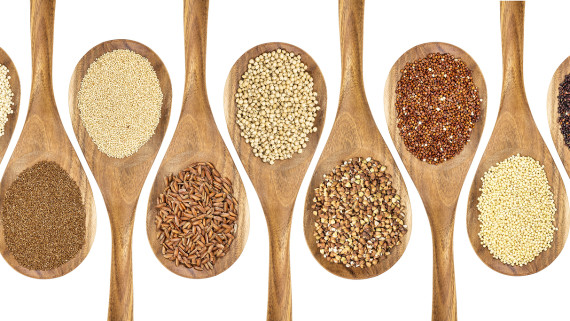Why you should SOAK your grains!

A few years back I tried Paleo for quite a few months and it didn’t work for me- I was tired, had less energy and my hair started falling out. It doesn’t mean that this will happen to everyone- it just means that every body responds differently to different foods and we all need to find diets that work for us specifically. Grains can be part of a healthy diet, they just have to be prepared properly.
When I started adding grains back into my diet I went back to one of the simplest things as learned as a student of the Institute for Integrative Nutrition back in 2006- soaking grains before cooking. Sure lots of rice and especially quinoa packages say that they don’t need to be rinsed or soaked but if you want to really absorb the nutrients in those foods then they really do need to be soaked.
Whole grains contain a little something called phytic acid, an anti-nutrient that binds with minerals such as zinc, phosphorous, calcium and iron, preventing them from being absorbed by the body and also happens to be hard for the body to digest. In short, we’re not receiving the nutrients of whole grains if we aren’t getting rid of the phytic acid.
Soaking your grains before cooking them is the easiest way to neutralize the phytic acid and release the enzyme inhibitors. Doing this makes them not only easier to digest but also makes the nutrients more accessible to be absorbed by the body. Soaking also helps break down gluten in wheat, spelt, rye and barley.
All you need to do is cover your grains in fresh, filtered water the night before you plan on preparing them. If you forget to do it the night before, even a few hours of soaking will help but 8 hours is a great number to shoot for. After you’ve covered the grains with water just let it sit on the counter at room temperature. If something comes up and you end up not cooking your grains when you intended that’s fine, just change out the water after 24 hours.
I personally take soaking my grains one step farther by adding in about a 2 inch strip of seaweed (I also cook my rice with it). This helps add some very important minerals especially iodine which so many of us are deficient in and is especially important for thyroid disorders.
The only other thing to remember is that the longer you soak the shorter the cooking time will be. When you’re done soaking make sure to rinse with filtered water and use less water when cooking, for example for 1 cup of white rice I usually use 1 ½ cups of water and check on your grains frequently to make sure they don’t over cook!
The only grains I don’t soak are whole rolled oats which I eat during the warmer summer months instead of steel cut oats.
Give it a try and see if you can feel the difference in your digestion after you’ve soaked your grains!
BONUS TIP! I also cook my grains with a mix of at least 50% bone broth instead of water to sneak in some added nutrition for myself and my lovely family members that otherwise won’t eat bone broth!










